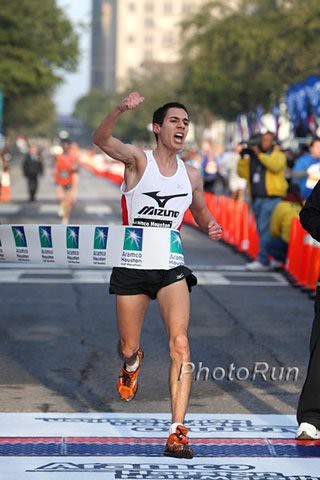 Before this year, Antonio Vega’s U.S. championship results were nearly always buried under faster, more famous runners. He finished seventh at the 2009 U.S. Half Marathon Championships, sixth at the 25K, and 10th at the 10K. Vega was one of those second-tier elites: definitely fast, but not the fastest.
Before this year, Antonio Vega’s U.S. championship results were nearly always buried under faster, more famous runners. He finished seventh at the 2009 U.S. Half Marathon Championships, sixth at the 25K, and 10th at the 10K. Vega was one of those second-tier elites: definitely fast, but not the fastest. But that’s changed.
In January, Vega, a member of Team USA Minnesota, dominated the U.S. Half Marathon Championships, winning the race with an impressive 61:54—the only runner to dip under 62 minutes. And at the Gate River Run last month, Vega took third. He’s now headed to the Boston Marathon where he hopes to capitalize on his recent success and make a run for top American honors.
Running Times: Why did you decide to run the Boston Marathon?
Antonio Vega: I was looking for a spring marathon. I’ve done Twin Cities twice and I was just looking for a bigger marathon and Boston was just the next logical step.
You’ve indicated before that you want to run 2:12 there. Are you still shooting for that goal?
AV: Yes. I think somewhere in the 2:10 to 2:12 range would be what I think I can run this time around—obviously this is dependent on what the weather is going to be like in Boston.
Where did the 2:12 time come from?
AV: After running the Houston Half Marathon where I ran 61 minutes, 5:00 [per mile] pace felt like something I could handle, which is right around 2:12 pace. It’s definitely something I think I can do for the marathon.
Have you been doing marathon pace workouts at that goal pace?
AV: Actually, I’ve only done one workout at marathon pace: 15 miles and it was a little bit quicker than that. That’s a good indicator. We do it on a 2.5-mile loop that is tougher than the Boston course.
When did you do this workout?
AV: It was about two weeks ago after the Gate River Run.
Because of the amount of downhill running in Boston, have you been doing downhill-specific workouts?
AV: Yes. My coach and I sat down and decided that it would be a good idea to do my long runs over a hilly loop, which is that 2.5-mile loop I talked about. I’ve done almost all my long runs on that. The loop has a lot of long downhills on it. I feel like doing something like that is really going to help late in the race when my quads are beat up from the downhill running.
You mentioned that your 2.5-mile loop has a lot of downhill sections, but have you done anything that focuses on downhill running, like downhill repeats? Are you doing uphill repeats as well?
AV: We’ve been doing a lot of 1K repeats where the first 500m is all uphill and the second 500m is all downhill and then you turn around and do the same thing. We’ve been doing lots of things up and down hills. For myself, I’m not as concerned about the uphills on the course as I am about the downhills because you don’t normally see a lot of downhill running in a marathon or any other road races.
It seems like nearly everyone is talking about Meb and Hall as the best American prospects at Boston, but in some circles your name is getting floated around as the race’s dark horse. What do you think about that?
AV: I think it’s kind of cool that my name is kind of getting out there. Up until this year, I was pretty much unknown as far as who I was and what my accomplishments were. It makes me feel like I’m moving in the right direction after all the hard work I’ve been putting in over the last nine years. It’s finally starting to pay off.
Considering that you are a contender to be top American in Boston, what’s your race strategy going to be with regards to Meb and Ryan? Will you go out with them at the beginning?
AV: It’s really hard to have a strategy going into a race like Boston, because of all the top guys that are in it. Obviously, if you want to run 2:12, you got to go out a little quicker than 66 minutes for the half. The marathon’s a race where you know you are going to start slowing down, so you want to bank a little time. For me at least, a lot of it depends on how the race goes out. I’d like to go out in low 65s and hope for the best in the later parts of the race.
In a previous interview, you said that your coach, Dennis Barker, is “continuously testing all of [your] systems.” I think what you were getting at is that you aren’t training serially, like doing base and then speed, etc., right?I
AV: Yeah that’s it. Dennis’ philosophy with the marathon is that he wants you going into the race as fresh as possible. He always says that if the marathon got canceled and all of a sudden they changed it to a 5K on race day, you will still be able to run a really fast 5K even though you’ve been doing all this marathon stuff. It’s weird, because in the middle of our marathon stuff, I’ll do repeat 200s or 100m hill sprints. It’s kind of funny because that’s not the type of distance you’ll be running or the type of muscle fibers you will use during the race.
READ ON...




 ShareThis
ShareThis